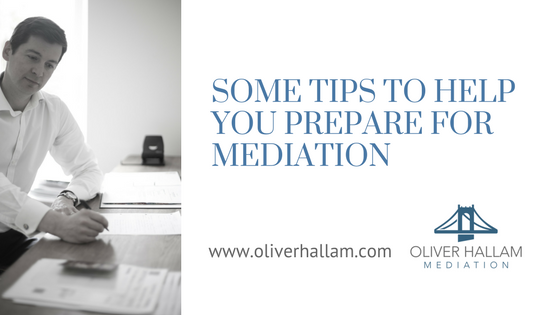How to prepare for mediation – some tips
Mediation is an opportunity to reach an agreement that is acceptable to all parties. Every mediation is different because it is a flexible and fluid process, but the way to ensure you get the most out of the day is to prepare. Good preparation is key.
In a mediation, the case will be discussed but you will not need to make a formal presentation of your case like you would in court or arbitration using evidence and witnesses.
The mediator will have talked confidentially with you or your solicitor prior to the mediation day and you or your solicitor will probably have briefed the mediator on the background to the dispute as well as the current position.
Come prepared to negotiate effectively. The mediation day may be short or long but every minute is an important chance to focus on finding a solution to the issues at hand.
Think about how you would like to see the case settled and how that settlement could be achieved:
Do you know your case?
Ensure you have all the information you need to evaluate the case. If something is missing or you need further information from the other party, contact the mediator immediately.
List the facts as they will be discussed on the day.
Identify and analyse the main legal issues involved.
List the strengths and weaknesses of your case and see if you can list the strengths and weaknesses of the other side’s case as well. The mediator will be questioning both sides about their case and you will want the mediator to develop tough questions to ask the other side.
Ensure that everyone who needs to be at the mediation is present otherwise the case cannot settle.
Ensure you have details of the costs you have incurred to date and estimates of future costs.
Avoid putting limitations on the mediation process. Try to keep an open mind. No one can force you to offer or accept any settlement.
Have you developed a settlement strategy?
Remember that the goal of the mediation is to obtain a settlement and stop further costs, risk and time.
Develop a negotiation plan, including where you want to settle and how you plan to get there. Try to identify the issues that might cause you to change your mind, such as additional or clarified information.
Plan to offer or demand during the private meetings what you will eventually be prepared to settle for. At the mediation session do not insist that the mediator simply act as a messenger, carrying offers back and forth. Allow the mediator some discretion to develop possible settlements. An advantage of the mediation process is that each side has the ability to test offers without having to disclose a specific amount.
Be open and frank with the mediator. Assist him in determining the best method of persuading the other side of your position.
Determine if there are any facts that you do not want to disclose to the other side and either keep them to yourself or tell them to the mediator in confidence. Remember that you are trying to convince the other side that your settlement position is reasonable. If there are facts that the other side will become aware of later and which may influence the outcome, do you have anything to lose by disclosing them now? It may help settle the matter now rather than later.
Authority to settle
It is essential that all sides come to the mediation session with sufficient authority to agree and settle the issues. Are all the necessary people attending? Do they have the power to approve a settlement? This means the parties themselves and not just their professional advisers.
All persons who need to approve the settlement should be present at the mediation session.
There may be an opening joint session with all parties present
The mediator will say a few words to open the joint meeting and may then ask each side to make a short opening statement of perhaps 4 to 5 minutes explaining the current position. If you have decided to make an opening statement, prepare it before the session. It is an opportunity to explain your view of the case and to show that you wish to be constructive and to find a solution to the issues.
Your statement might include the following:
Introduce yourself and perhaps indicate that it is your wish to work towards a settlement.
Briefly go over the key facts of the case. If the other side has gone first, you may wish to indicate where you agree or disagree with their statement of facts.
Explain your analysis of liability based on the key facts of the case.
Be realistic: you will want to present your case in the most favourable way by emphasising your strengths, but do not ignore any weaknesses.
Avoid specific settlement figures at this stage.
Avoid emotive language and show your willingness to work towards a solution.
Other things to prepare
Do you know the time and location of the mediation? Arrive in good time. Arriving late sends the wrong message.
Take your papers and copies of any documents you plan to give to the mediator and the other side. Don’t forget your phones, laptops and chargers if you might need them.
Consider making a couple of pages of notes to help you express all the key points you wish to make on the day.
Calculate within what range you would like to settle the case. What offers or demands could you make that might move the negotiation into your settlement range?
If you need any help, contact the mediator who will be happy to answer any questions you have.
Finally..
Remember that the mediation is a chance to bring your dispute to an end. Focus on what it will feel like to have the dispute behind you and make this your goal.


